高中英语 Module1 Unit2 word explain学案 外研版必修1
高一英语外研版必修1学案:Module 2 Section Ⅴ【含解析】
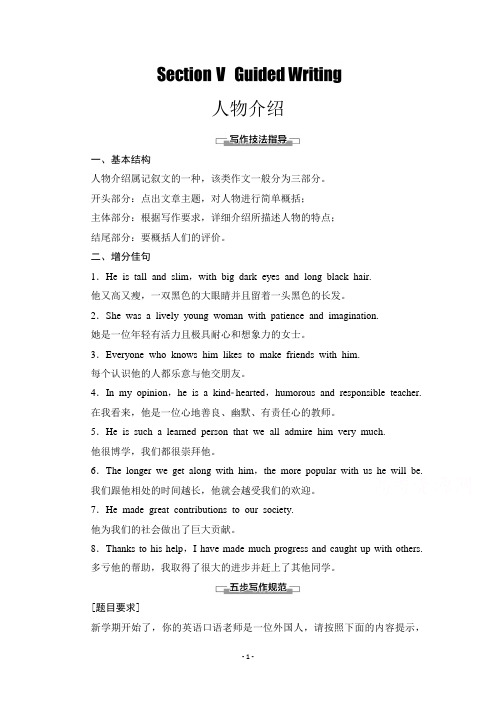
人物介绍一、基本结构人物介绍属记叙文的一种,该类作文一般分为三部分。
开头部分:点出文章主题,对人物进行简单概括;主体部分:根据写作要求,详细介绍所描述人物的特点;结尾部分:要概括人们的评价。
二、增分佳句1.He is tall and slim,with big dark eyes and long black hair.他又高又瘦,一双黑色的大眼睛并且留着一头黑色的长发。
2.She was a lively young woman with patience and imagination.她是一位年轻有活力且极具耐心和想象力的女士。
3.Everyone who knows him likes to make friends with him.每个认识他的人都乐意与他交朋友。
4.In my opinion,he is a kindhearted,humorous and responsible teacher.在我看来,他是一位心地善良、幽默、有责任心的教师。
5.He is such a learned person that we all admire him very much.他很博学,我们都很崇拜他。
6.The longer we get along with him,the more popular with us he will be.我们跟他相处的时间越长,他就会越受我们的欢迎。
7.He made great contributions to our society.他为我们的社会做出了巨大贡献。
8.Thanks to his help,I have made much progress and caught up with others.多亏他的帮助,我取得了很大的进步并赶上了其他同学。
[题目要求]新学期开始了,你的英语口语老师是一位外国人,请按照下面的内容提示,介绍你的口语老师。
Unit 1 导学案 高中英语外研版必修第二册
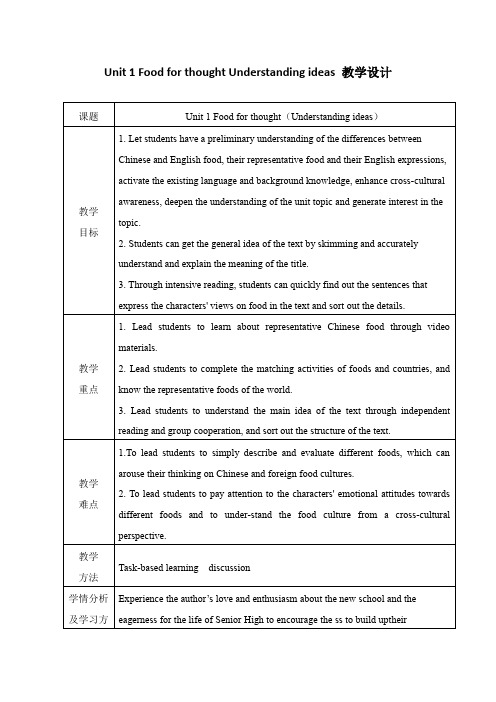
Unit 1 Food for thought Understanding ideas 教学设计课题Unit 1 Food for thought(Understanding ideas)教学目标1. Let students have a preliminary understanding of the differences between Chinese and English food, their representative food and their English expressions, activate the existing language and background knowledge, enhance cross-cultural awareness, deepen the understanding of the unit topic and generate interest in the topic.2. Students can get the general idea of the text by skimming and accurately understand and explain the meaning of the title.3. Through intensive reading, students can quickly find out the sentences that express the characters' views on food in the text and sort out the details.教学重点1. Lead students to learn about representative Chinese food through video materials.2. Lead students to complete the matching activities of foods and countries, and know the representative foods of the world.3. Lead students to understand the main idea of the text through independent reading and group cooperation, and sort out the structure of the text.教学难点1.To lead students to simply describe and evaluate different foods, which can arouse their thinking on Chinese and foreign food cultures.2. To lead students to pay attention to the characters' emotional attitudes towards different foods and to under-stand the food culture from a cross-cultural perspective.教学方法Task-based learning discussion学情分析及学习方Experience the author’s love and enthusiasm about the new school and the eagerness for the life of Senior High to encourage the ss to build uptheir法confidence and be prepared to meet the challenge , in Senior High and learn to be positive about the life素养水平Level 3 of language ability and level 2 of learning ability信息技术应用PPT, application of video and pictures, and other information techniques教学过程环节教学活动学生活动设计意图素养提升点问题情境导入Leading -inActivity 1Watch a video clip tocatch a glimpse ofworld food.Listrelated words andphrases.Take notes.Read andexplain thewords.Lead in to the topic ofthis unit and arouseSs’ interest.language abilitythinking quality教学过程Step 1.T asks Ss to observethe pictures.Step 2.T asks Ss to read thethe first paragraph.Step 3.T asks Ss to scan theObserve thepictures andmake aprediction.Ss read the firstparagraph toconfirm theirprediction.Ss scan thepassage to getGet to know somebasic information.Learn readingstrategy--scanning.Learn readinglearning abilitylanguage abilitycritical thinkingculture awarenessthinking qualitypassage.Step 4.T asks Ss to skim the passage.Step 5.T asks Ss to listen to the tape to work out the structure of the passage.Step 6.T asks Ss to summarize different people’s opinion towards different cuisines.Step 7.T asks Ss to put words and expressions discussed them in groups according to to know moreabout the text.Ss scan thepassage to getto know themain idea.Ss read thepassagecarefully tofind outsupportingdetails.Ss have agroup discuss.Ss answer thequestioput words andexpressionsdiscussed themin groupsns.strategy--skimming.To work out thestructure of thepassageTo read for detailsand read between thelines .To build word bank.T asks Ss to have agroup discuss aboutsome questions.To develop Ss’ criticalthinking ability.culture awarenesslanguage abilitythinking qualitylearning abilitylanguage abilitylanguage abilitythinking qualitylearning abilitylanguage abilitythinking qualitythe context.。
外研版高中英语必修1Module2教案
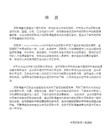
只能跟 to do sth. 作宾语的动词
既能跟 -ing 也能跟 to do sth. 作
love, hate, prefer, begin,
既能跟 -ing 也能跟 to do sth. 作
记得曾经做过某事 remember to do sth 记住
教案1--Module2.
教案 Edited by Wang Qijiang Bazhong No. 5 Middle School August
ning of the positive adjectives
feel like, give up, can't
put off, be busy in, have some
…to, stick to, object to(反
), thanks to, get
开始,着手)
I am looking forward to seeing
我盼着再见到你。
教案 Edited by Wang Qijiang Bazhong No. 5 Middle School August
)只能跟-ing形式作宾语的动词及短语
admit, avoid, advise,
考虑), delay, enjoy,
students (5) ________ to learn from her. If she can teach
But I think you (7) ________ to follow an older teacher?
---------------------------------------------------------------------------
外研版高中英语必修1Module2教案高一外研版必修1Module 2 My New Teachers教案
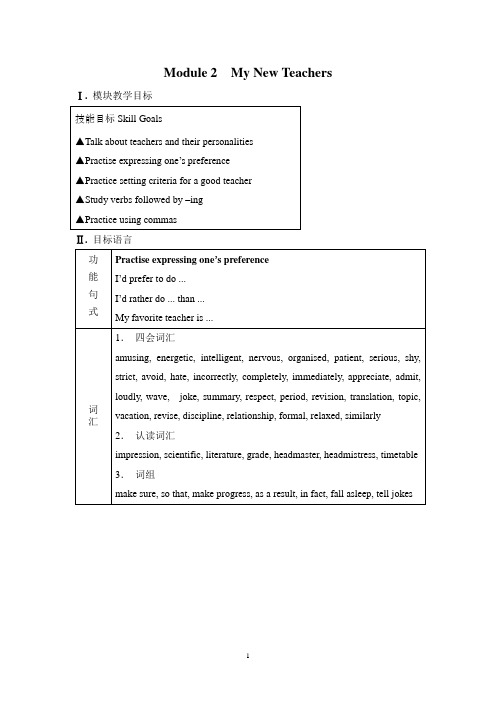
Module 2 My New Teachers Ⅰ. 模块教学目标Ⅱ. 目标语言Ⅲ. 教材分析和教材重组1. 教材分析本模块以My new teachers为话题, 介绍了几位具有不同教学风格和个性特征的教师,旨在通过模块的教学使学生学会描述教师及校园生活,并能运用所学词汇、句型来表达自己的喜好,同时通过学习制定好教师的标准使师生之间相互了解。
1.1 INTRODUCTION 首先介绍描述人物个性特征的形容词,再通过听说训练使学生在运用中熟练掌握这些形容词。
1.2 READING AND VOCABULARY 中的课文分为三部分,从学生的角度对三位不同年龄,不同风格的教师作了介绍。
从文中读者可了解三位教师的性格特征、授课方式及学生的评价。
文后设置了完成句子、写词、问答及讨论等阅读理解题,检测学生对课文的理解,培养学生获取信息、猜测词义等能力。
1.3 GRAMMAR 讲解了本模块的语法项目v?鄄ing形式。
1.4 SPEAKING 是课文内容及本模块话题的延续,要求学生通过口头练习运用所学语法知识描述自己喜爱的教师、科目及喜欢的原因。
1.5 LISTENING AND VOCABULARY分为六部分来进行。
Activities 1, 2 && 3分别以问答和听力练习的形式让学生就有关校园生活的词汇进行练习。
Activity 4要求学生表述自己对英语学习的看法并阐述原因,既巩固了所学生词,又运用了本模块的语法V?鄄ing 形式。
Activity 5 给出八组有联系的词,要求学生解释它们之间的联系。
Activity 6 回归课文,复习旧词汇,并表述对Mr Stanton的看法。
1.6 PRONUNCIATION 以听读的方式学习单词重音,为听力的提高奠定基础。
1.7 FUNCTION AND SPEAKING 列举了表达喜好的句式,要求学生以问答方式就自己所学科目进行对话练习。
1.8 EVERYDAY ENGLISH通过补全对话的形式学习一些日常用语。
2020_2021学年高中英语Unit2教案外研版必修第一册

Unit 2 Exploring English
课题
Unit2 Exploring English
--Presenting ideas 学科英语班级Class
授课教
师
教学目标1 引导学生通过本单元的学习,对英语语言的多样性和创造性有更深入的理解,能够反思自己的英语学习方法,树立正确的英语学习观,保持对英语学习的兴趣;
2 引导学生运用本单元所学内容,恰当地表达自己对英语学习方法的观点,形成适合自己的英语学习方法,并阐述选择该学习方法的理由;
3 引导学生联系自身实际,对自己的英语学习方法进行改进和创新,培养批判性思维和创新思维。
重点掌握故事写作的基本要素(时间+地点+人物+事件)
难点反思自己的英语学习方法,对自己的英语学习方法进行改进和创新。
教学方法Cooperative learning.
Debating.
教学内容与过程Step1 Leading-in
教师带领学生反思自己的英语学习方法,讨论有创意的英语学习方法。
第一步:带领学生回顾本单元有关探索英语、学习英语的具体内容。
第二步:学生以小组为单位,展开头脑风暴,思考自己在英语学习中有哪些值得推
广的方法,同时反思哪些学习方法需要改进。
第三步:各小组对组员现有的学习方法进行改进或优化,列出有创意的英语学习方
法。
Work in groups. Talk about creative ways to learn English. List your ideas
on a piece of paper.
备注。
高一英语外研版必修1学案:Module 2 Section Ⅱ【含解析】

Ⅰ.单词拼写根据汉语或首字母提示,写出下列单词1.Our teachers often tell us that we should be strict(严格的) with ourselves in our work.2.He felt rather nervous(紧张的)before this exam, so he didn't do well.3.He shows great respect(尊敬) for his parents, who he thinks have given him deep love and care.4.Finally, he admitted(承认) that something had gone wrong with the plan.5.Try to avoid(避免) sweet food, which will worsen your health.6.I stopped laughing when I realized that John was serious about it.7.I deeply appreciate your help with my English homework.8.If you want to catch that train, you'd better set off for the station immediately.9.Make a summary of the passage in no more than80words.10.The building was completely destroyed by the big fire.Ⅱ.拓展词汇根据词性和汉语提示,写出下列单词1.amuse vt.使某人高兴→amusing adj.有趣的;可笑的→amusement n.有趣;可笑2.energy n.精力→energetic adj.精力充沛的3.organise vt.组织→organised adj.有组织的;有系统的→organisation n.组织4.patient adj.耐心的→patience n.耐心5.science n.科学→scientist n.科学家→scientific adj.科学的[寻规律、巧记忆]“聪明”有几何?adj.+ly→adv.intelligent adj.聪明的clever adj.聪明的smart adj.机灵的bright adj.聪明的completely十分地;完全地incorrectly不正确地loudly大声地immediately立即根据提示补全下列短语1.make sure确定;确信;查明;弄清楚2.agree with同意;适合3.make mistakes犯错误4.make progress取得进步5.as a result结果是6.in fact事实上7.fall asleep睡着8.tell jokes讲笑话;开玩笑Ⅳ.选词填空选用上述短语的适当形式填空1.He was caught in the heavy rain yesterday.As a result, he got a bad cold.2.He's really amusing and usually tells jokes when he thinks we're getting bored.3.In order to make progress in English, he works hard every day.4.Make sure that all the windows are closed before you leave.5.Because he was tired after work, he fell asleep quickly.[寻规律、巧记忆]表示“事实”的词汇fall相关短语全扫描in factas a matter of factactuallyfall asleep睡着fall ill生病fall behind落后背教材原句记句式结构仿写促落实1.She's kind and patient, and she explains English grammar so clearly that even I can understand it!她友善、耐心,把英语语法解释得清清楚楚,甚至连我都能理解!so...that...“如此……以至于……”,that引导结果状语从句。
外研版高中英语必修1Module2教案

外研版高中英语必修1Module2教案外研版高中英语必修1Module2教案一、教学目标通过本模块的学习,学生能够:1、掌握与模块主题相关的词汇和语法知识,如不规则动词的变化、名词和代词的用法等。
2、提高听、说、读、写四项语言技能,特别是听力和口语表达能力。
3、运用所学语言知识完成本模块的交际任务,如简单的对话、短文写作等。
4、了解中西方文化差异,增强跨文化交流意识。
二、教学内容与步骤1、Warming up(热身活动,5分钟)引导学生看模块标题“Module 2:My New Teachers”,让他们预测本模块的主题和内容。
教师提问学生:“What do you think this module is about?”学生自由回答,鼓励他们使用已学知识进行猜测和推断。
2、Vocabulary and grammar(词汇与语法学习,15分钟)(1)词汇:教师展示一些与“teachers”相关的图片和例句,引导学生学习新单词和短语,如“describe, impression, feedback”等。
同时,复习已学过的相关词汇,如“interesting, friendly, strict”等。
(2)语法:通过练习和讲解,让学生掌握不规则动词的变化和名词、代词的用法。
例如,“am/is/are”的变化、名词的复数形式、“this/that/these/those”的使用等。
3、Listening and speaking(听与说,15分钟)(1)听力:播放一段关于三位新老师的对话,让学生听并回答问题:“What do these teachers look like? What are their teaching styles?”等。
然后,教师展示一些与听力材料相关的图片,让学生根据听到的内容进行匹配和填空练习。
(2)口语:让学生两两一组,根据所学的词汇和语法知识,描述自己的老师,可以涉及外貌、性格、教学风格等方面。
外研社 必修一 MODULE 2 导学案
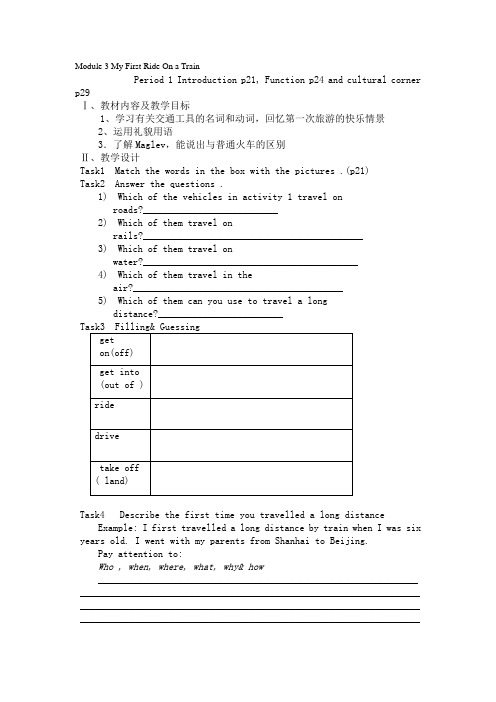
Module 3 My First Ride On a TrainPeriod 1 Introduction p21, Function p24 and cultural corner p29Ⅰ、教材内容及教学目标1、学习有关交通工具的名词和动词,回忆第一次旅游的快乐情景2、运用礼貌用语3.了解Maglev,能说出与普通火车的区别Ⅱ、教学设计Task1 Match the words in the box with the pictures .(p21)Task2 Answer the questions .1)Which of the vehicles in activity 1 travel onroads?___________________________2)Which of them travel onrails?____________________________________________3)Which of them travel onwater?___________________________________________4)Which of them travel in theair?__________________________________________5)Which of them can you use to travel a longdistance?_________________________Task4 Describe the first time you travelled a long distance Example: I first travelled a long distance by train when I was six years old. I went with my parents from Shanhai to Beijing.Pay attention to:Who , when, where, what, why& how________________________________________________________________ ____________________________________________________________________ ____________________________________________________________________ ________________________________________________________________________________________________________________________________________ _____________________________________________Task5 Read the conversation :p24 Then discuss the following Qs:1.What do you think of the ticket inspector’s atti tude?2. What expressions could you use to change it ?Act the conversation with the following sentences :Excuse meCould IWould you mindI’m very sorry butThe fact is thatTask 6 Cultural corner (p29)1). Read the following passage and find out the topic sentence of eachpart.New words:Complete: (vt)完成Magnetically: (adv)有磁性地Levitate: (v)使------飘荡Levitation: (n)升空飘荡之力Chancellor: (n)奥地利等国的总理,首相2).Read the passage again: Answer the following Qs:(A) What are the main differences between a magnetically levitatedtrain and an ordinary train?________________________________________________________________ ______________________________________________________________________________(B)What are the advantages of travelling on a Maglev train?________________________________________________________________ ________________________________________________________________ ___________________3). 探究知识点(A).具体时间的表达方法:____________________, ___________________(B). Attend: 的词义____________, 词性_________, 基本用法______________________________. 例如辨析:attend, join, take part in⏹1)attend : 指_________________________________________⏹eg.⏹2)join : 指___________________________________________⏹eg.⏹3) take part in: 指____________________________________⏹eg.(C). reached a speed of 501 kms-----⏹reach在本句中的词义________, 其它用法有__________________________________________⏹ reach up to ________________⏹这座山海拔1000米。
- 1、下载文档前请自行甄别文档内容的完整性,平台不提供额外的编辑、内容补充、找答案等附加服务。
- 2、"仅部分预览"的文档,不可在线预览部分如存在完整性等问题,可反馈申请退款(可完整预览的文档不适用该条件!)。
- 3、如文档侵犯您的权益,请联系客服反馈,我们会尽快为您处理(人工客服工作时间:9:00-18:30)。
高中英语 Module1 Unit2 word explain学
案外研版必修1
word explain(外研版必修1)课题:The second part of the words in unit2 of Module1学习目标:learn new words and know about the explanations of the new words、课前预复习:read the words and recite the language points、问题解决:
1、stay up 我昨晚熬夜学习到很晚。
I studied a lot yesterday and very late、玉树地震后,这一地区的建筑物很少有没到倒塌的。
Only few of the buildings in this area after the terrible earthquake in YuShu 、
2、 handle vt、N 我不知道该如何处理这件事情。
他转动把手,打开了门。
He and opened the door、Handle oneself handle well/badly
3、 as if = 有时候他表现得好像根本不爱我们Sometimes he acts he does not love us at all、她待他如陌生人。
She treats him he a stranger、(与现在反)他说话的样子,好像他知道她在哪里似的。
He talks he knew where she 、(与现在反)他说起罗马来好像他以前去过罗马似的。
He talks about
Rome he there before、(与过去反)他张开嘴好像要说什么。
He opened his mouth he something、(与将来反)练习反馈:
4、insist vi insist on insist that ⑴坚持认为,从句用陈述语⑵坚持要求,一定要,从句用should 加动词原形,should 可省略他坚持认为他没偷钱,应该被释放。
He insisted that he the money and ( )
set free、比较:⑴insist on 多用于坚持意见、看法、主张,后接名词、动名词。
⑵stick to 坚持,坚守,多指原则、计划、决定、诺言、意见等的坚守,其后接名词。
我们必须坚守我们的任务直到完成。
We must our task till it is finished、5、worried adj 担心的,担忧的 be worried about worry about
6、harm vt n harm sb do harm to harm one′s image
/reputation harmful adj be harmful to harmless adj
7、annoyed adj annoying adj be annoyed with sb be annoyed at/for/about sth be annoyed to do sth 我太粗心大意,使她很生气。
He got very me about my carelessness、8、confused adj confusing adj confusion n 困惑,混乱 in confusion 困惑地 be confused about/by confuse sb/sth with…把。
跟。
混淆从他迷惑不解的表情中,我知道他对这个难懂的问题感到迷惑不解。
From his look, I know he is about the question、9、tend vi vt n tendency 倾向,趋势
tend to do sth tend to/towards tend sb have a tendency to do sth have a tendency to /towards 他有自私自利的倾向 he tends selfishness、当别人不同意她,她很容易生气。
She get angry when others disagree with her、课堂小结:
limit n vt set a limit to go beyond/over the limit within limits reach the limit without limits limited adj limitless adj 课后巩固:
balance vt、 Vi、n 平衡,抵消保持平衡失去平衡学习反思:Balance A with/and B balance the budget 我失去平衡,摔了一跤。
I and fell、。
